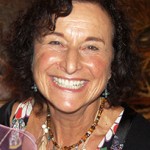Despite ongoing research, the causes behind what we call sensory processing disorders remain unknown. This is because causation is likely a mixed bag of genetic, epigenetic, environmental, neurodevelopmental, and cultural factors. The important question Ph.D. Stephanie Mines addresses is what we as parents, therapists, educators and care-providers can do about this growing epidemic in an empowered and sustainable way, no matter the causation.
In her debut interview on Scholar Hangout, Stephanie Mines shares a case study of what is possible even when sensory integration disorders are extreme.
Her research and work in sensory processing disorders has led her to authoring numerous books; her latest: New Frontiers in Sensory Integration. Stephanie works with people around the world on how they can help children coping with sensory disabilities.
You’re invited to follow the discussion and submit questions via Twitter at #ScholarHangout.
Sophie’s Sensory Processing Disorder Case Study Takeaways
- Focus on Health and Potential: Sophie’s case study teaches us to believe in the intelligence of neurodiverse children and youth and to maximize their potential through our empathic attunement to them. Despite daunting predictions, Sophie has defied the statistics by remaining mobile, engaged, participatory and vibrantly healthy.
- Integrate Applied Touch Methodologies: The clinically tested applied touch interventions that Sophie has experienced do not conflict with her other therapies. On the contrary, they enhance the effectiveness of other therapies by increasing her overall relaxation, receptivity and health.
- Advocacy is Enlightened Parenting: As parents heighten their awareness of their child’s intelligence and gifts they become authentic, educated, and informed advocates. Advocacy is a path to enlightened parenting as it encourages adults to differentiate and refrain from projection through increased awareness of who the child really is separate from the adult.
- Limbic Stimulation is Interactional Reciprocity: Limbic stimulation requires interacting with the child from their perspective, following the child and sharing their experience. Rather than trying to get something to happen, the adult learns what is already happening in the thoroughly experiential, somatic and non-conceptual world of the child. All children immediately benefit from this co-participatory congruence that validates their unique beinghood. They sense the non-judgmental, non-evaluatory relationship as safe and liberating. This immediately supports learning and development.
- Storytelling and Mirroring Enhance Development: Narrative and imaginative storytelling in a playful and positive way relaxes the child’s nervous system and cultivates a healthy sense of self. Both mirroring and storytelling counteract the isolation that plagues neurodiverse children who are acutely sensitive to their difference. Because mirroring and storytelling require relationship, they enhance limbic development.
- Use Your Brain to Anchor a Sensory Needs Child: Neurodiverse children frequently experience overload that can be chaotic due to the fragmentation in their sensory filters. When adults are stable, differentiated co-participants in the child’s experiential world their interaction with the child serves as an anchor to support and ground the child. This increases the child’s self-confidence and gives some ballast for their interface with others.
Meet Stephanie Mines in Oklahoma
Stephanie will be facilitating a family friendly event that includes children’s activities (geared for children with sensory needs), healthy snacks, readings from her book, and handouts for parents and caregivers. The event will be from 2 to 5 p.m. on July 19th at Uptown Grocers, Edmond, Oklahoma. Autographed copies of New Frontiers in Sensory Integration will be available.
A workshop on July 20th at Third Street Yoga in Edmond will offer in-depth advocacy support for parents and caregivers of children with sensory needs.
Author
 Dr. Stephanie Mines is a psychologist whose unique understanding comes from her academic research as well as her extensive work in the field. Her stories of personal transformation have led many listeners to become deeply committed to the healing journey. Dr. Mines understands shock from every conceivable perspective. She has investigated it as a survivor, a professional, a healthcare provider, and as a trainer of staffs of institutions and agencies. Meet Stephanie.
Dr. Stephanie Mines is a psychologist whose unique understanding comes from her academic research as well as her extensive work in the field. Her stories of personal transformation have led many listeners to become deeply committed to the healing journey. Dr. Mines understands shock from every conceivable perspective. She has investigated it as a survivor, a professional, a healthcare provider, and as a trainer of staffs of institutions and agencies. Meet Stephanie.



